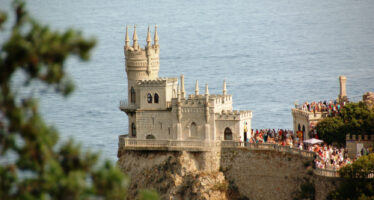Karzai in India on crucial visit
![]()
Afghanistan and India set to forge closer ties as Afghan leader visits New Delhi during an unstable time in region

The talks in New Delhi could include training for Afghan forces, which might strain ties with Pakistan further [Reuters]
Hamid Karzai, the Afghan president, has arrived in New Delhi on a two-day visit described by India as an opportunity for both countries to consolidate their strategic partnership and discuss bilateral, regional and international issues of mutual concern.
Tuesday’s visit comes against a backdrop of shifting relations in the region.
During his second trip to the Indian capital this year, Karzai will meet Manmohan Singh, the Indian prime minister, and sign several strategic agreements, including some on development aid and security.
Some analysts in India predict that Karzai will elevate the role of India in stabilising his violence-torn country as he eyes a drawdown of US-led troops by 2014 after more than a decade of fighting.
They argue that Karzai is losing patience with Pakistan, whom he accuses of funding anti-government groups, and is unable to count on the US.
“Karzai’s visit comes at a crucial juncture to endorse India’s involvement in Afghanistan,” Saeed Naqvi from the Observer Research Foundation think-tank told the AFP news agency.
“Karzai is coming to India to confer on India the tag ‘reliable ally’… India will get the right to play a more pronounced role [in Afghanistan] after Karzai’s visit.”
The Indian Express newspaper reported on Sunday that Karzai would sign a “strategic partnership” agreement with Singh, the first such pact with any country in the world.
The proposed alliance, which foreign ministry officials declined to confirm, was said to include an Indian commitment to increase its training of Afghan security forces, including the police.
Indian involvement in Afghanistan is sensitive because of the delicate and often deadly power games in South Asia.
Pakistan’s ‘double-game’
In a primetime national address on Monday, Karzai accused Pakistan of “pursuing a double-game”, saying Islamabad is not co-operating in the battle against armed groups to establish peace in Afghanistan.
Karzai said he had always stood by friendly relations with Pakistan, hoping to face the challenge of cross-border extremism together, but his neighbour had failed him, continuing to use “terrorism as a means”.
“The Islamic republic of Pakistan has not co-operated with us to bring peace and security to Afghanistan, which is unfortunate for us,” he said.
He also called for a review of his country’s plans to pursue peace with the Taliban, saying he will focus on talking to governments and not specific groups related to them.
 Afghans took to the streets of Kabul on Sunday, chanting slogans against the Pakistani authorities [Reuters]
Afghans took to the streets of Kabul on Sunday, chanting slogans against the Pakistani authorities [Reuters]
Karzai acknowledged that his efforts for peace had failed as his overtures were met with more violence and targeted killings, most recently of his chief peace negotiator, Burhanuddin Rabbani.
“The killings show that our call for peace has not seen a positive response. One-sided desire for peace will not bring a resolution. Peace can only be achieved with those who believe in it.”
“We have to fight decisively against those who do not believe in peace.”
Karzai’s comments follow Pakistan’s criticism by Admiral Mike Mullen, chairman of the US joint chiefs of staff, who accused Pakistan’s intelligence agency last month of playing a role in the recent attack on the US embassy in Kabul.
Mullen called the powerful Haqqani network, operating out of Pakistan’s borderlands, a “veritable arm” of Pakistan’s military intelligence.
The comments did not go down well with Pakistan.
Yousuf Raza Gilani, the Pakistani prime minister, convened an all-party conference to discuss the US allegations and draft a strategy on how to move forward in the relationship.
In particular to accusations from Afghanistan, Pakistan has asked for the “blame game” to be stopped.
“Certain forces are at work to destabilise Afghanistan and Karzai should not play in their hands. Instead we should get united to foil their machinations,” Gilani said on Sunday, according to the Pakistani paper, Daily Times.
Gilani said his government was committed to bringing peace through dialogue with Taliban in the tribal areas. They would not disarm but only “decommission” the Taliban, he said.
‘No ties with ISI’
In a related development, the leader of the Haqqani network has rejected US allegations that his group is linked to Pakistan’s intelligence agency, the ISI.
Al Jazeera’s Inside Story looks at why the Afghan president has abandoned peace talks with the Taliban
Sirajuddin Haqqani, in an interview with BBC Pashto, denied that the Haqqanis, blamed for the recent high-profile attacks on Western targets in Kabul, were behind the killing of Rabbani.
“We haven’t killed Burhanuddin Rabbani and this has been said many times by the spokespersons of the Islamic Emirate,” he said, referring to the Taliban.
Afghan officials have blamed the Taliban for the September 20 turban bombing, saying Rabbani’s killer was Pakistani and that the attack was plotted by the Afghan Taliban’s leadership body, the Quetta Shura, in Pakistan.
However, no Afghan officials have specifically accused the Haqqani network over the killing.
The network is considered loyal to the Taliban supreme leader, Mullah Omar, and has a seat on the Taliban leadership council.
Afghan officials say they have shared their investigation with Pakistani authorities and that they will request a UN inquiry into the murder if Islamabad refuses to co-operate.
Related Articles
Varios caminos de la historia se entrecruzan en La Habana
![]()
La importancia global de una isla con apenas diez millones de habitantes en un mundo en el que viven alrededor
Crimea, regalo de “Occidente” a Rusia
![]()
¿Qué creían los mediocres políticos que gobiernan Estados Unidos y la Unión Europea? ¿Que nada menos que Vladimir Vladimírovich Putin
Obama Walks Fine Political Line on Terror Threat
![]()
President Obama spoke Friday about the discovery of explosives on planes bound for the United States.By HELENE COOPER and PETER



